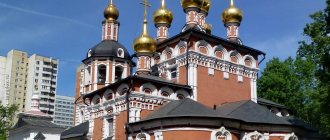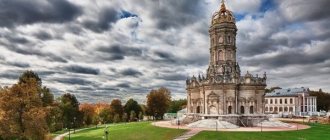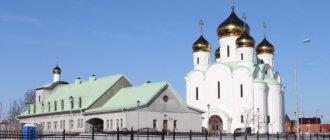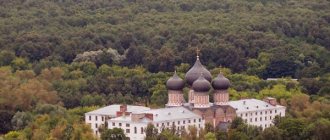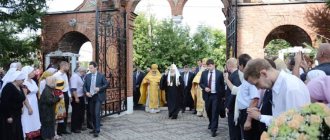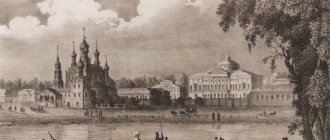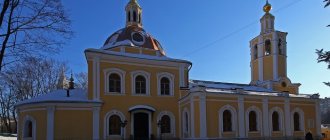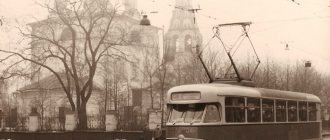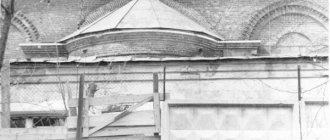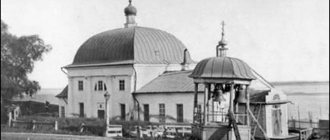In 1760, construction began on the stone Church of the Exaltation of the Cross in Altufyevo . It took almost four years to build the temple, and the project was financed by a certain lieutenant Ivan Ivanovich Velyaminov, who bought the town of Altufyevo in 1759 from the great-grandson of Fyodor Akinfov, Yuri Nikolaevich.
Velyaminov received the blessing to begin construction of the Church of the Exaltation of the Cross from Metropolitan Timofey of Moscow and Kaluga himself. Some local historians claim that the Metropolitan personally consecrated the temple in honor of the Exaltation of the Holy Cross in Altufyevo during a ceremony on October 30, 1763.
But what was here before these events? There is no exact answer. According to one version, before building a new church, Ivan Velyaminov ordered the dismantling of the old one, built by the Akinfovs and standing for about a hundred years - from the 70s of the 17th century, in 1687 it was consecrated in the name of St. Sophia and her daughters Vera, Nadezhda and Lyubov . According to another version, the old church simply burned down during a fire.
The new church in Altufyevo, built by Lieutenant Velyaminov in 1763, was consecrated in honor of the Exaltation of the Holy Cross. Who drew up the design of the temple for Velyaminov, who laid the walls and painted the walls, history is silent. However, art historians called the architectural style that the builders used “like bells.”
Church of the Exaltation of the Holy Cross today
The canonical name of the temple is “In the name of our Lord Jesus Christ, in memory of the miraculous Exaltation of His Honest Life-Giving Cross.” The colloquially called “Vozdvizhenskaya” church is today located within the city between Altufevskoye Highway and the Moscow Ring Road, on the territory of a park with an area of 10.3 hectares, next to the former noble estate and the surface of a small reservoir.
For residents of 2 microdistricts - Altufyevo and Lianozovo, such a neighborhood is a gift of fate, for believers who have the opportunity to satisfy their spiritual needs, and non-believers can enjoy the beauty of the park, the architecture of estate buildings and the temple itself, standing out from the gray landscape of urban multi-story boxes.
The Church of the Exaltation of the Holy Cross in Altufyevo today is not only a center for religious worship, but also an important cultural space for education and recreation for many believers in the city.
History of the construction of the temple
The very first documentary mention of the Altufyevo estate dates back to 1585, during the reign of Emperor Theodore Ioannovich. At this time, the settlement belonged to a housekeeper named Myakishev. The wooden church, built on the Samotyshka River in 1564, was converted into a stone one 120 years later.
Church of the Exaltation of the Holy Cross in Altufyevo
The Altufyevo estate flourished serenely until the Time of Troubles came, which shook the Fatherland to the depths. By the 17th century, the settlement fell into decay and was completely deserted. The Akinfov brothers, whose family had a beneficial influence on the development of the village, began to be called the owners.
- In 1687, their descendant, Nikita Akinfov, planned the construction of a stone cathedral. The house of God was erected in a short time, calling it first the Godfather House, and after a while Vozdvizhensky.
- In the middle of the 18th century, the Akinfov family decided to sell the estate, and I. Velyaminov became the next owner. The owner first started building a new church, because the outdated building had become completely unsuitable for holding services.
- The construction of the Cathedral of the Exaltation lasted four years; it boasted external decoration made in the architectural style of the late Baroque. The Holy Cross Church received the necessary bell tower over the western part, but there was no refectory room here.
- In 1766, I. Velyaminov decided to sell his own estate, which changed owners several times in subsequent years. Two decades later, the village was acquired by a wealthy landowner S. Kurakin, who came from a noble ancient family. He began to modernize not only the estate, but also the Holy Cross Cathedral, the shape of which was changed in some parts. Finally, the temple acquired its own refectory, and a new bell tower was erected above the arch of the building, and a smooth and even floor was laid.
On a note! During the attack of the French army on Moscow in 1812, the village of Altufyevo was completely plundered. The Church of the Exaltation lost its property: the enemies stole sacristies, candles, some icons and the financial reserves of the brethren.
Architect, exterior decoration, architectural ensemble
The Church of the Exaltation of the Holy Cross in Altufyevo, built in 1763, has not survived to the present day in its original form. What remains from that time, architecturally, is late Baroque. The quadrangle with rounded corners and risalits is presented three-dimensionally; one risalit is allocated for the altar, the rest for the entrances.
This showed originality not observed in other temples. The outer walls are decorated with projections, recesses and window frames with peculiarly curved, false windows. By the end of the 80s, the number of parishioners began to grow, and a refectory was added to the main building, but this measure did not change the situation; the church could not accommodate all the believers.
In the “dashing” 90s, a large-scale reconstruction of the temple was carried out, according to the design of the architect Nikolai Vladimirovich Nadezhdin. Initially, the church had a round volume with a diameter of 12 m and an upper tier in the form of an octagon and a bell tower.
After reconstruction, the temple lost its old bell tower, and in its place a polyhedron with glazed windows was installed, after which the building lost its historical value. The area became twice as large, but there was no proportionality. Previously, the temple was considered a bell tower, but now it has ceased to be so, the former belfry was destroyed.
The crossbars from which the bells were suspended were removed. The openings were glazed, the ceiling of the former belfry was painted, and a new three-tier bell tower was erected nearby.
New limits appeared, the altar was refurbished, it became larger and more spacious. All extensions were made to match the main old building. Parts of the decor were painted red. This technique, as a decorative element, was created on purpose - deliberate distortion.
Two additional chapels built on the territory of the temple strengthened the architectural ensemble. One above the spring is in honor of the Monk Macarius of Zheltovodsk, the other is in honor of Saint Uar, the funeral service for the dead is held in it, and there is also a church bench here.
Current state
The Church of the Exaltation of the Cross was built in a style called “under the bell.” This architectural type was widespread in Russian architecture at the beginning of the 16th century. Such original structures were erected only on the territory of Ancient Rus'; there are no similar analogues in Western countries. For the most part, projects “under the bell” appear as small pillar-shaped churches, but they give a lot of scope for the architect’s imagination.
- The octagonal tier of the bell is located directly above the cathedral premises. The main volume is round in shape and has a diameter of 12 meters. Three apses are attached to the light drum of the temple. The windows of the second tier were created in the Moscow Baroque style.
Central iconostasis of the Holy Cross Church in Altufyevo - The central altar of the church was consecrated in honor of the Exaltation of the Cross, the left one in honor of St. Macarius of Zheltovodsk, the right one in honor of St. Jonah, who was the rector of the cathedral. The Cathedral of the Exaltation of the Cross contains icons extremely revered by the Orthodox tradition: a copy of the Kazan Mother of God, the image of Sergius of Radonezh and the Matrona of Moscow.
History of construction
The village of Altufyevo, the place where the temple is located, once belonged to the Akinfov brothers. One of the descendants erected a stone temple in the village in 1687. Already at the beginning of the new century, the church was damaged in a fire, after which it acquired a new name - Sophia. Akinfov soon sold the village, the new owner Ivan Velyaminov rebuilt the temple.
The date of completion of construction was 1763 - it is now considered the foundation of the temple, since its former name Krestovozdvizhenskaya returned to it.
But after 3 years Velyaminov sold the estate. Altufyevo, together with the temple, was owned by many eminent owners, including Count Apraksin, Countess Bruce and Prince Kurakin. After the revolution, the Temple did not disappear, but continued to work, fulfilling its duty to believers.
Finding itself within the city in 1960, surrounded by two microdistricts Altufyevo and Lianozovo, the temple itself, the estate, the pond, the garden and all the outbuildings acquired the status of a monument and came under the protection of the State.
In 1986, an extension to the Temple was built in an attempt to expand its capabilities. By decree of His Holiness Patriarch Alexy II in 1991, Archimandrite Jonah was appointed rector of the temple, now he is in the rank of Metropolitan of Astrakhan. Archimandrite Jonah, with the blessing of His Holiness the Patriarch, initiated the reconstruction of the church and its transformation into a large, beautiful temple.
The completely reconstructed temple was consecrated by Patriarch Alexy II on September 27, 1999 and served a prayer service with Metropolitan Jonah and Archbishop Arseny.
Don’t miss the most popular article in the section: Optina Pustyn Monastery - how to get there from Moscow, address, where it is located, history and interesting facts.
Interior decoration
The Church of the Exaltation of the Cross is one of those churches where restorers put a lot of effort into painting walls, ceilings, installing mosaic panels and stucco moldings. Under the guidance of architect Nadezhdin N.V., art restorers D.P. Kostylev, Yu.V. Goryanaya, V.P. Myasoedovs. and A.V., painted and decorated almost all corners of the temple.
Church of the Exaltation of the Holy Cross in Altufyevo - view from the inside.
Paintings were made in the altar of the temple and its vaults:
- The image of the Mother of God is on the eastern wall of the temple, and here is the image of John the Baptist.
- The vault of the southern wall is decorated with the composition “Transfiguration of the Lord.”
- Images of Moscow saints and images of evangelists are inscribed in the medallions of the temple petals.
In total, more than 35 biblical scenes and images of Saints are used in the painting of walls and ceilings; they are made in light, joyful colors, making the interior spaces light and airy. Church utensils are stylized in the 19th century.
Many iconographic images and works of old masters are framed in beautiful and expensive frames. The four-row iconostasis, covered with red varnish and trimmed with gold, has no empty spaces, everything is filled with images. The high artistic quality of decoration and the skill of creating mosaic panels are recognized, but it is believed that they do not fit into the overall style of the interior.
Holy Cross Church inside
After the reconstruction of 1991-1995, the Church of the Exaltation of the Holy Cross became much more spacious and brighter. A hole was punched in the dome of the “old” church, connecting the light drum with the main volume, and the vaults were painted with scenes on gospel themes.
During the reconstruction, the iconostasis was also replaced. The current iconostasis is four-row, with gilded columns, decorated with carvings. It is separated from the solea by a very beautiful carved metal lattice.
The iconostases in the refectory, as well as in the baptismal church and the chapel of the Martyr Uar, were made in the same style.
In the passage leading from the refectory to the pre-altar space, the walls and semicircular arch are covered with mosaic frescoes.
In the new spacious refectory, the chapels of St. Macarius of Zheltovodsk and Unzhensk (left) and St. Jonah, Metropolitan of Moscow Wonderworker (right) were built. There is also an altar of the Holy Martyr Tryphon, consecrated in 1980 so that two liturgies could be served on holidays and Sundays.
In the chapel of St. Jonah there is an ark with particles of his relics, as well as the relics of St. Mitrophania of Voronezh, St. Macarius of Zheltovodsk and Unzhensk the Wonderworker, St. Theophan the Recluse and the Kiev-Pechersk saints.
In the chapel of St. Macarius there is the main shrine of the temple - an icon of the saint with a particle of his relics.
Shrines and relics of the temple
The wealth of the Temple of the Exaltation is not limited to the external merits and beauty of the interior design; the main value is the prayed-up shrines and relics of saints and saints.
Among them:
- Image of the Kazan Mother of God;
- Image of the Mother of God “All-Tsarina”;
- Image of Patriarch Tikhon with a piece of the coffin;
- Image of Macarius of Zheltovodsk with part of his relics;
- Image of Sergius of Radonezh with part of his relics;
- An image of Paisius the Holy Mountain from the monastery of St. John the Theologian along with a piece of soil from his burial;
- Image of Matrona of Moscow with a piece of the coffin;
- Image of Bishop Favius of Rome with part of his relics.
There are shrines of images and a reliquary with particles of the relics of Metropolitan Jonah of Moscow, St. Theophan, Macarius of Zheltovodsk and 32 other Kiev-Pechersk saints and reverends.
After the revolution
The cruel years of the revolution spared the Holy Cross Church; it was closed only at the beginning of the Great Patriotic War, but in 1943 services resumed.
In 1986, due to the increase in the number of parishioners, an extension was made to the main volume, serving as a refectory. But it could not accommodate all the believers, especially on major holidays. Therefore, in 1993, construction began on a new refectory and bell tower (the old bell tower was converted into a light drum, breaking through the quadrangle arch). The area of the temple doubled, two new chapels appeared - St. Macarius of Zheltovodsk and Unzhensk and St. Jonah, Metropolitan of Moscow. In addition, the eastern apse, which now houses the central altar, was also enlarged.
In 1990, a baptismal church was built nearby.
Currently, the architectural ensemble of the Church of the Exaltation of the Cross consists of a three-tier bell tower topped with a high spire, a spacious refectory, a main volume with a light drum and a miniature dome. The apse is square in plan, with rounded corners; on its octagonal dome there is a miniature dome on a blind drum. The facades of the apse and refectory are decorated with mosaic panels depicting icons.
On the territory of the temple there are two chapels - the Holy Martyr Huar, where the funeral service for the dead takes place, and a church shop. In addition, a chapel was erected over the spring of St. Macarius of Zheltovodsk, which flows not far from the temple. In 1998, on the first floor of the clergy house, a baptismal temple was consecrated in honor of the holy martyrs Vera, Nadezhda, Lyubov and their mother Sophia.
Clergy, mentors
The Church of the Exaltation of the Holy Cross in Altufyevo is famous for its spiritual mentors and clergy. A place of honor among them is occupied by Metropolitan Jonah of Astrakhan, who devoted many years to service, and through his efforts a large-scale reconstruction was carried out, changing the appearance of the church.
Taking turns, Archpriests Kirill Shevtsov, Alexander Smedyuk and Nikolai Anikeev serve in the church. Priests – Savva Gagloev and Alexander Meister. Hegumen Pavel Polukov and Hieromonk Tikhon Baturin, Protodeacons Alexander Kireev and Andrey Tarakanov.
Parish and choir of the temple
The church parish is large and actively participates in church life and events that it holds outside its walls. Parishioners have extensive contacts with children's, patriotic, military and veterans' organizations. Much is done by the parishioners to maintain the vast territory of the temple in order. There are clean paths in the parks in the summer, no snowdrifts in the winter, on all approaches to the temple.
The church choir is very popular. The melodious singing of temple singers evokes, even among casual visitors, a feeling of spiritual cleansing and lightness, what believers call the grace of God.
Social work, everyday life
The care of “the orphans and the needy” does not go unnoticed by the temple, as commanded by the Savior. There is a “Mercy” group in the church, for people from this group there is a rule: on the day of Christ’s Bright Resurrection and on Victory Day, visit the hospice and support the sick there. Gifts, sweets, and fruits are brought.
The priests read sermons, and in such cases, the church choir always sings chants.
The Altufyevo orphanage is under the special care of the temple. Holidays are organized for children, introducing them to work and seeking consolation in prayer. On special days, the temple distributes free clothes to those in need. Help is provided to single parishioners, and visits are made to a nursing home in Mozhaisk near Moscow. Charity fairs are organized.
Sunday School
The Sunday school, organized at the Vozdvizhenskaya Church, annually enrolls students in 4 groups of children and teenagers. The youngest children are taught the Law of God and have classes in creative circles. For older children - the Law of God, the Church Slavonic language, Church choral singing and rehearsals for future performances.
Middle-aged children are taught the Holy Scriptures of the Old and New Testaments, the Church Slavonic language, choral singing and performances. Classes on Christian morality have been added to the older group.
The Sunday School additionally organizes a variety of clubs that develop interest in work and creativity, such as embroidery and icon painting. There are their own clubs - youth and military-patriotic "Guardian". Training is provided free of charge.
Service schedule, operating hours
There are no days off in the Temple; it is always open to parishioners and pilgrims. Worship services are held daily. The Divine Liturgy begins in the morning at 8:40. Custom prayer services are served daily at 8:00. In the evening at 17:00 Vespers begins, followed by Matins. On Christian holidays and Sundays, two Divine Liturgies are held, one at 6:40, the other at 9:40.
During the hours when there is no service, a priest and a novice are always present in the church - the duty officer of the church; they will always help the person who enters and answer any question. The temple opens for parishioners at 8:00 and closes at 20:00. On Sundays and holidays the Temple is open from 6:30.
Divine services in the Church of the Exaltation of the Cross
Divine services in the Church of the Exaltation of the Cross are held daily.
- At 9:00 - Divine Liturgy. After the liturgy, custom prayers are served.
- At 17:00 - Vespers.
On Sundays and holidays, two Divine Liturgies are celebrated: early - at 7:00, late - at 10:00. Custom prayer services on Sundays are served after the end of the early liturgy.
During the day the temple is open to visitors. The priest on duty and his assistants from among the parishioners are always present here. They are always ready to answer all questions.
Information for pilgrims
Pilgrims wishing to visit the Temple will be interested to know that the honorary rector to this day is Metropolitan Jonah of Astrakhan and Kamyzyan, in the world - Yuri Karpukhin, who from his youth devoted himself to serving God and the Holy Church of Christ.
Recently, in 2016, having celebrated his 75th birthday, he is full of strength and visits the Temple on High Holidays. It is a great joy for parishioners to take part during the service conducted by Bishop Jonah.
Where is it located, what is in the surrounding area, how to get there
Getting to the Temple is easy; it is located at the edge of the Moscow Ring Road at the intersection with Altufevskoye Highway. On the other side of the Altufevskoe highway, there is a closed traffic police post, popularly called “Antoshinsky”; it was in this place that the famous TV series “Capercaillie” was filmed.
Address of the Temple: Moscow, Altufevskoe highway, building 147. Telephone number of the Temple is 8 (499) 209-54-22, you can always get all the necessary information from it. By public transport you can get to the Temple from the Altufyevo metro station by trolleybuses - 80 or 73 or by buses - 685,644 and 836. Go two stops.
After reconstruction, the Church of the Exaltation of the Holy Cross in Altufyevo lost its historical value in the eyes of historians, but despite this, it acquired a cultural and religious value that is more necessary in modern life in the eyes of parishioners. The mission of such a place is to bring people faith, hope for a better life and love for their neighbors.
Author: Vyacheslav Ivanovich (ormino)
Article design: Oleg Lozinsky
Temple over the pond
Church of the Exaltation of the Holy Cross in Altufyevo.
Photo: Yu. Degtyarev / MosDay.ru This story actually happened, only the name of the heroine was changed at her request.
Victoria has lived in Moscow for 30 years. She came here in the late 1980s, and came completely by accident. If you can, of course, put it that way.
Vika was then a little over twenty, she had just trained as a librarian in Kharkov and was working out the required 3 years of assignment - a debt to the state for free education. She was assigned to a small village as the head of the library, where she was both the boss and the only employee. She was immediately besieged by local guys who suddenly showed an extraordinary interest in reading, especially in the library reading room, that is, at the table littered with fresh newspapers and magazines, directly opposite the desk at which Vika was sitting. It’s a common thing - a new girl always arouses burning curiosity, even despite her external appearance. But the new librarian’s data was quite good, and the surge of interest did not subside, and one leading tractor driver intensified his advances to such an extent that Vika almost cried.
“He’s directly following me, he literally doesn’t give me access—after work, I can’t get home for hours (to my lonely grandmother Mota’s rented apartment). He holds her under the elms at the gate and persuades her to marry. One thing keeps repeating: you won’t get away from me now, don’t even hope! His mother had already secretly come to Aunt Mota to enlist her support... He’ll steal more, what good can you expect from all this,” she complained to her friends when she arrived in her hometown for the holidays.
“And the other day we received an order from Moscow, from the Ministry of Defense, they are recruiting female military personnel,” said Marina, a nurse from the local military registration and enlistment office. – Do you want to go, serve two years in the army, and see Moscow? In this case, they are exempt from assignment work!
Vika had never been to Moscow before and, after a short hesitation, agreed to a tempting offer. Live in Moscow for two years in full comfort, see all the sights, the Tretyakov Gallery! For some reason, the Tretyakov Gallery seemed to her to be the biggest miracle in the capital.
Everything happened incredibly quickly, and a week and a half later (by the way, on her birthday, and, as she found out much later, on a big church holiday) Vika was sitting in a compartment car of a fast train, paid for by the military department, and was traveling to a wonderful, mysterious Moscow.
The Moscow station seemed grandiose to her, the piles of buildings on the other side of the Moscow River looked like fairy-tale castles . Vika looked greedily at the people around her - in her expectations they should have turned out to be somehow special and even dressed in a completely unusual way, that is, not at all the same as in all other places of their vast homeland. But the people did not seem special, and Vika decided that the station was, perhaps, not yet the real Moscow.
Following detailed instructions received at the military registration and enlistment office, she successfully reached the General Staff Clinic, where she was sent to serve. And here already - the ancient Moscow boulevard, and the impressive buildings of the Headquarters and the Polyclinic, and especially the abundance of military senior ranks and the countless number of doctors in snow-white coats, with the inspired look of oracles scurrying in all directions of the intricate corridors of the mysterious Polyclinic - everything delighted her and a little didn't it plunge me into awe and culture shock?
– Do you know who you will work as? – the head nurse of the Polyclinic, small, pretty Nina Ignatovna, who later turned out to be almost her countrywoman, asked her in her office.
Vika didn’t know, because for some reason the military registration and enlistment office didn’t tell her this, vaguely referring to the fact that they didn’t know it, and that “don’t worry, they’ll tell you everything on the spot.” And Vika, euphoric that such incredible changes were ahead, somehow didn’t even bother with this issue.
Vika experienced real stress. How will she, a librarian, wash the floors??
– We are recruiting female military personnel to join the junior medical staff of the clinic, that is, nurses. Their duty is to assist nurses throughout the working day and also to clean the floors in the department. If you are not ready for such work, then now you can still refuse and leave, but when you take the military oath, it will no longer be possible to do this... Go to the hostel now, talk to the girls, and tomorrow you will finally decide.
Vika experienced real stress. How will she, a librarian, wash the floors?? Nowadays, when the cult of higher education reigns everywhere, only elderly women can do this! But it was also unthinkable to return ingloriously without seeing Moscow... What to do?? Maybe we should somehow endure these two years, because it’s unlikely that such an opportunity will ever present itself in life...
Vika was shown the Clinic. The junior nurses - in elegant white shoes, in snow-white starched gowns and the same starched caps on their heads - were almost no different from other medical personnel. Already when Vika was working in the dental department of the Polyclinic, one day an old retired general approached her in the corridor and, unfolding his medical book, respectfully asked:
- Sister, please explain what is written here?
“I’m not a sister...” Vika told him.
- Oh, sorry, doctor! – the general exclaimed apologetically...
And in the second year of service, the head of the department, colonel of the medical service Dmitry Anatolyevich B., called Vika into his office twice and advised her to enroll in a medical school, where almost all the female nurses studied in the evenings. But Vika, who had lost consciousness since childhood at the sight of blood on her own finger, did not see herself in this profession at all.
The Ministry of Defense dormitory also turned out to be beyond all expectations, although with extremely strict rules, which, of course, were fully justified by military discipline. It was a brand new 16-story building on the northeastern outskirts of Moscow, where an entire corner entrance was reserved for female military personnel. Cozy one-room and three-room apartments, in which 2-3 girls lived per room, were fully equipped with everything necessary - from a wide variety of dishes and table lamps to free laundry of bedding, which the residents were also provided with. In general, the state and the army tried to compensate for the unprestigious work with the maximum number of household amenities, as well as a full package of benefits under the general military contract.
In a word, life, as happens in youth, settled down quite quickly, and everything went as usual. On her first day off, Vika went in search of the Tretyakov Gallery. Coming out of the metro station of the same name, she noticed a policeman on the corner standing at his glass booth, and, approaching, asked:
– Tell me, please, how can I get to the Tretyakov Gallery?
The policeman looked at her from the height of his heroic height and said:
- You're late, girl, it's already closed.
- How is it closed? – Vika was surprised. – It’s only the middle of the day, it’s closed for lunch break, isn’t it?
“Closed for restoration,” answered the law enforcement officer. - Come back, girl, in two or three years.
But neither the policeman, nor even Vika could have imagined that such times would soon come when all plans would be canceled and even the very foundations of life would be shaken, and that the Tretyakov Gallery would open not in 3, and not even in 5, but in almost 15 years…
Well, in the meantime, Vika, with the passion of a discoverer, rushed to explore Moscow. Almost every weekend it was planned to visit either a famous theater, or a museum, or a concert, or an excursion to a historical place, or even just a walk along the ancient Moscow streets and alleys. The capital, without stint, revealed its riches to her. But still, Moscow saved its most important and most mysterious treasures for time - and revealed it to it much, much later...
It was already the second year of service, when suddenly Vika learned that if you transfer to the apartment maintenance department, then in a few years you can get a Moscow registration and a room in a communal apartment... The work offered there was not at all romantic - cleaning office premises, but it was possible living in the same dorm apartment, and the working day was much shorter, which, in general, was also a plus.
The temptation was great, and Vika, not without trepidation, deciding on yet another change in her destiny, nevertheless submitted a report requesting a transfer. She immediately signed up for typing courses, hoping to change her occupation over time, and also began preparing for exams at the Institute of Culture in order to continue her library education.
But then love happened to Vika. She appeared in the form of a very positive young man with a very pleasant, intelligent appearance, who graduated with honors from a prestigious metropolitan university and had absolutely no bad habits. He treated Vika with the most tender and friendly disposition, immediately introduced her into the circle of his closest friends and began to speak native words. They turned out to have many common hobbies - life was filled to the brim with events... Vika decided that this was fate, and entrusted him with all her most valuable, girlish things - all of herself, with all her expectations, dreams and hopes that she had kept for so long. A year passed, the second, the third, their relationship became more and more tender and friendly, but Vika began to feel burdened by this evenness, behind which nothing more definite could be seen. To her timid hints, the young man replied that he needed to wait a little longer, that he was about to finally “get back on his feet”, would be able to rent an apartment, and then they would get married right away. And now he lives in the same apartment with his mother and married brother and is forced to sleep in the hallway... Pride did not allow Vika to ask why at least he still does not want to introduce her to his mother, and does not even give her his home number phone, limited to business calls only. She was afraid of somehow accidentally getting confirmation of her guess that he simply didn’t want to needlessly injure his mother with a girl from the hostel...
A little more time passed, and that evil hour struck, when something suddenly suddenly and completely went out in her soul, and even the ashes were scattered by the wind, and rain also fell from above. The young man became alarmed and began to “ring all the bells,” involving all her friends in the reconciliation process. However, just in case, he “honestly” warned that he still wouldn’t be able to get married now, he didn’t yet have the necessary “base” for this, but over time - “of course, undoubtedly - I don’t need anyone else!” But Vika didn’t want anything more. Or rather, not like that - she wanted to be left alone, and so that no one would bother her anymore.
And she really needed her own “corner.” After all, if nothing worked out even with such a pleasant young man in all respects, then we should probably abandon all hopes for a family hearth and seriously concern ourselves with a banal roof over our heads, our own personal one, for which no one could ever reproach her. But getting the “angle” didn’t work either. First, news came that they would no longer provide rooms, since the time had come for the mass resettlement of communal apartments in Moscow, and in order to get a separate apartment, you would need to work a few more years. And a few years later, those same gloomy 1990s arrived...
And a few years later, those same gloomy 1990s arrived...
Most people who remember them well hardly perceive the word “gloomy” as a metaphor - almost everyone has some kind of constant hopeless darkness and eternal bad weather in their memories. The sun seemed to be hidden forever in heavy, low clouds, and cold, dull rains fell endlessly. Moscow suddenly became gray and sloppy, with dirty streets - people throwing garbage right at their feet. On every corner, like poisonous mushrooms, stalls with tobacco and alcohol sprang up, selling to anyone, absolutely regardless of age. The approaches to the metro were blocked by ugly bazaars, where they sold everything mixed together.
The army found itself in disgrace; someone was clearly fueling hatred of the military in society. Officers were afraid to show themselves on the streets with insignia - they came to work in civilian clothes, changed into uniform in their offices, and when leaving home, put on civilian clothes again. There have been cases when a person was beaten on public transport simply because he was wearing shoulder straps. They showed on TV how, under the disarmament treaty, in the presence of satisfied foreign observers, the latest missile systems, which had no analogues in the world, were being cut into pieces. Officers stood nearby and cried from powerlessness...
Discipline in the dormitory was shaken, and the teacher on duty no longer came every evening before bed to find out if everything was in place. And one day, terrifying news spread throughout the hostel that one of the girls had been found murdered in a room at the Moscow Hotel... An investigator came to ask about the identity of the murdered woman, Vika was also called, but she was unable to tell the investigation anything useful, since she was not at all familiar with the unfortunate woman ...
They began to delay the payment of allowances, and once they did not pay them for 6 whole months in a row. By some miracle, only monthly food rations were invariably issued - several bags of cereals, several cans of stew and canned fish, tea, sugar. But in conditions of complete lack of money, this was enough for a week and a half at best. Everyone survived as best they could, and this was a very difficult task, because the law prohibited military personnel from earning money on the side. “You, of course, can resign of your own free will: due to the extraordinary situation, this is allowed to be done before the end of the contract,” the authorities said, “but part-time work will be regarded as a direct violation of military discipline, with corresponding consequences...” The corresponding consequences meant dismissal under the article. Some officers, with the tacit permission of their commanders, still worked part-time, most often as night guards in some expensive clubs and shops - after all, they had to somehow feed their families. There was a case when a young officer came to Moscow from a distant garrison and shot himself on Red Square because he was in despair at the complete impossibility of feeding his wife and children...
Truly hungry times came to the hostel. Those who had relatives in the Moscow region and neighboring regions, from time to time brought provisions from there and fed themselves, while the rest were forced to find various ingenious ways for basic survival. Vika benefited from her handicraft skills, which she had previously perceived mostly as a pleasant hobby. Now she not only sewed and knitted almost all her own clothes, which gave huge savings in money, but sometimes she did it for others, receiving for this a fairly significant remuneration for those times. Usually one of the girls came to her with a piece of fabric and said:
- Here, I have two meters of gabardine lying around here - sew me a skirt, and take the rest for yourself!
Or:
– Listen, here one girl from the 14th floor has a real woolen two-color blanket. She suggests unraveling it and knitting three sweaters. Let me unravel this blanket into yarn, you knit it, and we’ll get a free sweater for each of us!
One day, someone discovered at the Dolgoprudny railway station, not far from Lianozov, a flea market where the most unimaginable and unexpected things were sold, often nevertheless finding their buyer. Women soldiers, having inspected their personal closets and bedside tables and selected what was not vitally necessary at the moment, but still had some marketability, such as: brooches, beads and the like; an almost new bottle of perfume - “I only used it once!”; a box inlaid with straw - a gift from my brother for his birthday; a blue and gold tea pair - “well, I have two more of these, that’s enough for me”; etc. etc. - on a Saturday morning they went by train to Dolgoprudny, and there, right on the ground, on newspapers, they laid out their simple belongings at the station flea market. Someone managed to sell even an “optional” coat or a fur hat, but mostly it was considered serious luck, even if you could return home in the evening with a “three ruble” in your pocket! One of these lucky women once worriedly conferred with her friends:
– Do you think I can survive on these three rubles until the New Year?
For a long time afterwards, the residents of the hostel jokingly called her “Olya three rubles,” since there was still a good half of the month left before the New Year. Getting food for this three-ruble ruble was no less, if not more, difficult. As if by the wave of the hand of some evil wizard, the shelves of all stores, both industrial and food stores, suddenly became empty. Where all this went at one point remains a mystery for the majority of the country's population. But the shops opened at the appointed time - apparently by inertia - and the sellers, folding their arms on their chests and looking reproachfully at the dull customers, stood silently over the empty display cases, which under the glass were certainly covered with gray wrapping paper for some reason. Buyers persistently and methodically walked around empty stores - what if today something was “thrown out” on the counter?
One day, Vika found herself in the store at that fortunate moment when they had just been “thrown away,” and got as many as three dozen eggs, which was simply unimaginable luck, since they had not given more than a dozen “to one person” for a long time. At home, she put them in the freezer - and for a long time then she economically took out one egg at a time, cracked due to freezing, arranging for herself a small holiday in the form of a fried egg with one “eye”.
On another happy evening, when the electricity was never cut off and even the radiators under the windows were quite warm, Vika’s colleague Natalya came to see her. Vika at this time was already living alone in her one-room apartment. Her neighbor Tamara, a stately, black-browed and white-skinned Ukrainian, a nurse from the Polyclinic, was chosen by one of the doctors as a daughter-in-law. The wedding soon took place, and the blond major took Toma to his place of duty. And the second neighbor, nurse Masha, has been living with her aunt on Bolshaya Dmitrovka for the last few years, but the place in the dormitory was reserved for her, and therefore no one has moved in with Vika yet.
So, Natalya came in and asked:
- Listen, do you happen to have any flour? For the third day now I’ve been terribly hungry for soup with dumplings, but Svetka and I only have potatoes and carrots. Maybe there are a couple of handfuls?
“I still have some flour, but I haven’t been able to get potatoes anywhere for over a week now.” And there are even onions and dried herbs - Zemfira from the neighboring apartment treated her, her relatives recently gave her a whole bag of food by train.
- Well, then we’ll come now and have a feast at your place - I cook such a noble soup with dumplings, real Belarusian!
Natalya and her daughter Svetlana, also abandoned to the military department by the will of fate, served at a communications center and lived together in a one-room apartment on the floor below. Natalya was 12 years older than Vika, and Sveta was 12 years younger, and thus Vika was in a confidential friendship with both.
They sat peacefully in the warm kitchen. The soup with dumplings was eaten, and it was time for tea with jam.
“Listen, girls, what I’m going to tell you now,” Natalya said, putting the spoon on the edge of the saucer. – As you understand, our affairs are not important. I'm talking about apartments, of course. The line has been moving forward in recent years - like a centenarian dancing. And you, Vika, were completely bypassed. You were supposed to get a warrant for a one-room apartment this year, but they gave it to Rimma from the HR department. It's no secret that she's standing in line after you, but who can you complain to? Who will help? Such a time has come... hopeless. And Svetka and I are also in line for our “kopeck piece”, it is also unknown how long we will stand, and whether we will get it... Nobody knows what will happen tomorrow, whether anyone will need us at all. There is talk that this entire house will be given to officers as apartments, and the hostel will be transferred to the Moscow region, to the old building. And we will be completely laid off and sent to the place of conscription. And who is waiting for us there, please tell me? And certainly no one is going to provide housing there, at the place of conscription.
In general, this is what I want to say... There is a temple not far from Altufevsky Pond. And there are three such icons to which people from all over Moscow go to pray and ask for help in difficult life situations. And God helps – I’ve heard amazing stories! Christmas will be coming soon, so we also need to go and ask God to help us with the apartments. This is our last hope, there is nothing else we can count on...
Vika had a very unclear idea about God
Vika had a very unclear idea about God. And although, when she had to accidentally enter an Orthodox church once or twice, she felt such spiritual trepidation that she could not even hold back her tears, she still did not feel any special need for God and the church. And since Natasha now assures that people ask and God helps, then why not try... Still, the temple is definitely a good thing and cannot do any harm. For some reason, she knew this for sure, just as she knew that witches and sorceresses are bad and dangerous. Some girls went to these people from time to time and persuaded Vika:
- Let's go, this is interesting! And maybe she will say something useful!
Vika once succumbed to these convictions and went with them, but at the entrance of that house she was suddenly attacked by such an inexplicable cold fear that she could not take a single step further and, despite the entreaties of her friends, she turned back.
Christmas night arrived, and the three of them went along the shore of the pond to the illuminated temple. The fence and the temple itself were full of people, and soon the service began. Vika and Sveta, following Natalya, squeezed inside and found themselves at three large icons, in front of which stood candlesticks filled to the brim with burning candles.
“Stand here and pray - ask God to help us get apartments,” Natalya whispered. – You, Sveta, read the “Our Father”, as I taught you, but in general you can pray in your own words. The main thing is to ask diligently, with all your heart!
Before Vika’s eyes, three large icons in identical frames hung on the wall. One of them depicted the Virgin and Child, and the other two depicted some unknown saints. Vika imperceptibly squinted her eyes at Sveta. She stood, intently gazing at the icons, and her lips moved slightly. Vika also turned her gaze to the icons.
"God!! If you have such an opportunity... find funds... Oh, what am I saying...
God! If possible, help... I really need an apartment - a roof over my head... You probably know how many years I worked for this in various low-prestige jobs. And now everything around me is crumbling and crumbling at such an incomprehensible speed that I could literally find myself on the street at any moment. Where should I go then? My parents died a long time ago, there are no relatives on whom I can rely, I am almost alone in this world... Lord, if You exist, and if You can, help me, do something...”
Others who wanted to pray and light candles quietly pushed them aside. Vika looked at the surrounding people, the vaults of the temple, and then over the shoulders of the people tried to see what was happening there in front, and to recognize at least some familiar words in the prayers and chants. It was hot, cramped, hard to see and nothing was clear.
- Are you tired? – Natalya whispered from behind. - Okay, go out into the yard and rest a little. But don’t walk there for a long time, you need to stand in the service longer!
Vika and Svetlanka very willingly, although trying not to reveal it, got out of the temple. They began to look at the people in the courtyard, the Christmas trees installed at the entrance, the pond glittering behind the gates and the masses of dark houses on its other bank - the city was sleeping. Soon the frost began to creep under my clothes.
Natalya appeared on the threshold of the temple and waved her hand invitingly:
- Well, stop sitting there, otherwise you’ll freeze to the bench! You rested a little - that’s enough, go and pray at the icons, but don’t be lazy, ask properly...
And the service went on and on, and it seemed that it would not end for at least two more days. Natalya, taking pity, again let them go into the courtyard to gaze at the starry sky and stretch their numb legs, while she stood by the three icons, like a permanent sentry at a post of special importance. They returned home along the same road, along the pond, half asleep and tired, but extremely pleased with themselves - they managed to endure it and did not leave until the end of the service.
They went to that church once or twice more to ask in front of the icons for help in getting housing.
And when the miracle happened, it so stunned and dizzy with its fabulous joy that Vika completely forgot about going to the temple, and about her requests in front of the icons, and did not even think then to connect these events together...
A miracle happened, as expected, completely unexpectedly
A miracle happened, as expected, completely unexpectedly. One evening the doorbell rang, and Natalya appeared on the threshold - out of breath, with bright pink cheeks from excitement and a feverish sparkle in her eyes.
- Vika!!! - she exclaimed in a loud whisper, - today they gave me a warrant for a two-room apartment! I already went and looked! New house, in a new area, and the metro is not very far away. Svetlanka and I, of course, agreed; tomorrow I’ll go and register. I wouldn’t like to worry you needlessly, but I can’t help myself - there are rumors that a warrant has also arrived for a one-room apartment, and it seems like it’s for you... God willing, God willing! This is just some incredible happiness, I still can’t come to my senses!
At night, Vika dreamed of how the tall double door slowly and solemnly opened, and she entered the commander’s office, flooded with unprecedented golden-white light, and there sitting Andryushka, her childhood friend who died in a car accident, at a massive desk. He gets up and, handing her a piece of paper, says: “Here, your apartment has arrived...”. Vika, laughing at such good news and with joy that she sees Andryusha alive and unharmed, still shakes her head in disbelief: “It can’t be, it can’t be...”.
In the morning, Vika was called to the unit commander.
“There is an inspection warrant for a one-room apartment,” said the commander, rising from the table and handing her a small piece of paper. – Come, have a look, and if you like it, we’ll start decorating it.
In the opening of the high window behind the commander, the sun shone dazzlingly, flooding the entire office with its light...
After receiving these two apartments, the queue in the unit finally stopped - for as long as 10 years. And when, after troubled times, the military began to be gradually provided with housing, then apartments, as a rule, were no longer given in Moscow, but in the near Moscow region.
15 years have passed. A serious tragedy in life - the death of a loved one - brought Victoria to the temple, and now she was rediscovering Moscow - holy, joyful, otherworldly, filled to the brim with treasures that had no earthly value...
One day she came across a book about the Holy Cross churches in the capital. One of them was located in Altufyevo. She read with curiosity that the temple is located in an old estate, which at one time belonged to various eminent people, including the Moscow noble family of the Oltufievs, as well as the large oil industrialist and philanthropist G.M. Lianozov. That a stone church built on the estate was mentioned already in the middle of the 17th century. That the temple almost never closed, with the exception of a short break in 1941.
Victoria knew something about this temple before. I knew, for example, that the famous Moscow priest Dimitri Smirnov began his ministry there, and that in those years all Orthodox Moscow went there to listen to his sermons... As he himself said, the service in this church for him began with real miracles. The Soviet authorities, who wanted a smaller priest to be in the church, leaving early for home, assigned him to the farthest parish, and this turned out to be the parish of the Holy Cross Church in Altufyevo, where his great-great-grandfather, Archpriest Dimitry Alekseevich Smirnov, and great-grandfather Peter Smirnov, once served. who was buried here. And his grandfather, the new martyr and confessor Vasily Smirnov, also came here several times to serve... It seems that the young newly appointed priest himself learned about this amazing “coincidence” only after his appointment, from his relative.
“People from all over Moscow go there to pray and ask for help... And God helps!” – familiar words suddenly surfaced in my memory. But that’s... that’s what Natasha said! I was talking about this temple, because that’s where we went to pray and ask for apartments! They asked - and immediately received... it was a miracle, the great mercy of God... How did I not understand this then?!
They asked - and immediately received... it was a miracle, the great mercy of God... How did I not understand this then?!
It was as if a flash sparkled and illuminated everything - the puzzle was complete. Having abandoned everything, Victoria rushed to Altufyevo. A few stops on the metro, then a quick step along the street - and now you can see the bell tower, the dome, the red and white walls of the buildings, symmetrically overturned into the still water of a vast pond. A gate arch, a porch, and on the left, immediately at the entrance to the temple, a modest corner... There are also two candlesticks, although there are fewer candles now than on that Christmas night, when a whole fire was burning here. And behind the candlesticks on the wall are three large icons in an elegant golden icon case. Martyr Tryphon with a falcon on his shoulder, Archangel Michael and the icon of the Mother of God “Unexpected Joy”...
Victoria stood in front of the icons, and salty streams ran down her cheeks and onto her collar.
-Are you crying? Has something happened to you, sir? – a thin old voice rattled nearby. She looked back. A little thin old woman was taking off the burning candles. On the head – “not canonically”, almost in the form of a turban – there is a white scarf with small polka dots, with a long fringe hanging over the shoulder, intricately wound.
“No, I don’t have grief, I have joy...” Victoria breathed out.
- Oh, I see! There's constant crying here. First from grief, and then from joy. I've been watching this for 20 years. They stand and tearfully pray - to the martyr Tryphon for help in all everyday matters, to the Archangel Michael - as the main defender of the house, well, and the icon of the Mother of God “Unexpected Joy” speaks for itself, they pray to Her for everything. And then they come again and cry with joy! These are such icons - the Lord distinguished them according to His incomprehensible will... Wonderful are Your deeds, Lord!
The old woman, almost without lifting her feet from the floor, rustled with her tin into the right aisle.
These are such icons - the Lord distinguished them according to His incomprehensible will... Wonderful are Your deeds, Lord!
“Wonderful, wondrous are your deeds, Lord...” Victoria echoed after her, without taking her eyes off the icons. - But how can I now, so belatedly, thank you for that great mercy? How can I serve You even a little, because I have neither material resources nor special talents... However, it seems that I am sinning, so to speak. After all, I have a considerable gift for needlework, which literally saved me, helping me survive in especially difficult times... Let me, Lord, now serve You with this gift of Yours! By the way, I found out the day before that in the S-th monastery, where I go to services, there is a women’s gold-embroidery workshop, and everyone is invited there to embroider for the temple, for the glory of God. So if they take me there, it will be double joy for me...
This is how Vika thought, standing by the icons, and her thoughts involuntarily floated away into that distant, frosty-coniferous, blazing Christmas night, again feeling like the former foolish Vika, who came to ask and immediately received what she asked for, even despite the fact that then God There was no need to wait for her gratitude at all.
“...for He is kind to the ungrateful and the wicked...” (Luke 6:35).
